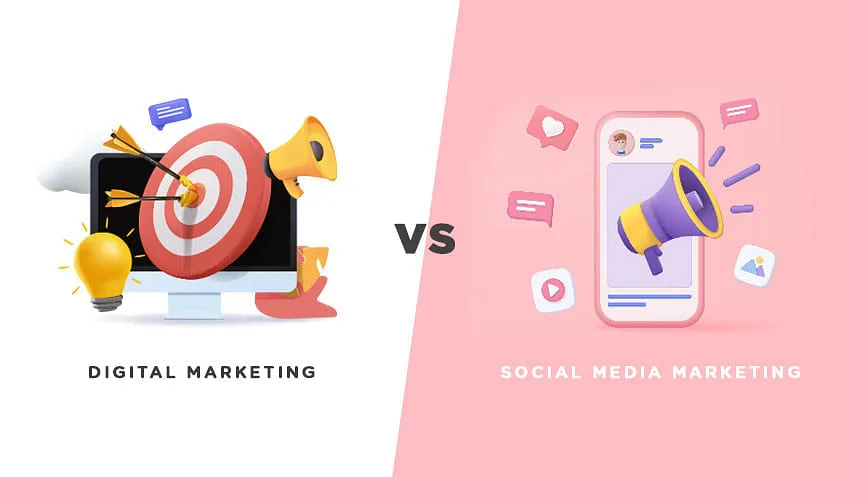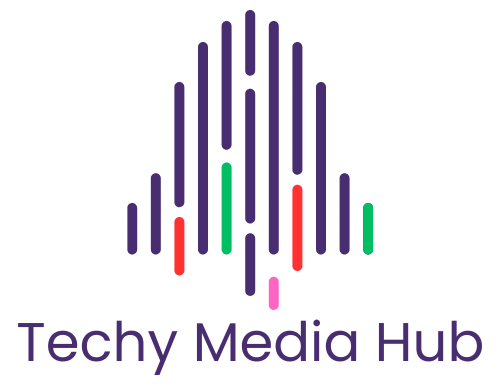
Social Media Marketing is a part of Digital Marketing, not the entire concept. If your primary goal is to increase brand awareness and directly connect with your audience, then social media marketing is a strong option. It helps in quickly boosting engagement and brand loyalty.
However, if you aim for long-term growth, organic traffic, and higher sales, then relying only on social media marketing is not enough. Digital marketing includes various other channels like SEO, PPC, Email Marketing, and Content Marketing, which contribute to 360-degree business growth. SEO and PPC drive organic and paid traffic to your website, while email marketing helps in building repeat customers.
What is Digital Marketing?
Digital marketing is a strategy that uses the internet and electronic devices to reach potential customers. It is an umbrella term that includes tactics like SEO, PPC, Email Marketing, Content Marketing and Social Media Marketing.
The main objective of digital marketing is to increase brand awareness, drive traffic, generate leads, and boost conversions.
Due to the rapidly growing number of internet users in India, digital marketing has become an essential tool for businesses. Its cost-effectiveness in reaching a large audience makes it a preferred choice for startups, SMEs, and large companies alike.
Pillars of Digital Marketing
In today’s digital era, Digital Marketing plays a crucial role in the success of any business. It consists of several key pillars that help establish a strong online presence and effectively reach customers.
Let’s explore these pillars one by one:
SEO (Search Engine Optimization)
SEO refers to optimizing a website or content to rank higher in search engines like Google. When users search for products or services, websites appearing at the top of search results receive the most traffic.
Content Marketing
Content Marketing is a strategy that focuses on providing useful and informative content rather than directly promoting a product or service. The idea is to educate, inform, or entertain the audience, which eventually helps in brand awareness, customer engagement, and conversions.
Social Media Marketing (SMM)
With millions of users active on platforms like Facebook, Instagram, Twitter, and LinkedIn, social media marketing is an essential strategy to increase brand awareness and customer engagement.
Email Marketing
Email marketing is a direct and personalized approach that helps businesses engage with their customers through emails. It is a powerful tool for improving brand loyalty and conversion rates.
Mobile Marketing
With smartphones becoming an integral part of daily life, mobile marketing is growing rapidly. This includes mobile-friendly websites, apps, SMS marketing, and push notifications.
- SMS Marketing: Sending promotional messages and offers via SMS.
- Push Notifications: Real-time alerts through mobile apps.
- App-Based Marketing: Developing a dedicated app for business growth and promotion.
What is Social Media Marketing?
Social Media Marketing (SMM) is a specialized category that utilizes social media platforms like Facebook, Instagram, Twitter, LinkedIn, and YouTube to promote a brand.
It involves creating engaging content, running paid ads, and interacting with users to enhance brand loyalty and drive conversions.
In India, where the number of social media users is increasing daily, businesses are leveraging these platforms to connect with their target audience in real-time. Due to cost-effective advertising solutions, even small businesses and entrepreneurs can establish a strong presence in the digital space.
Pillars of Social Media Marketing
In today’s digital-first world, social media is not just a platform for entertainment. it’s a powerful tool for businesses to connect, engage, and grow. Whether you’re a startup, a small business, or a large corporation, having a strong presence on social media can make all the difference.
However, success doesn’t happen by accident. It is built on a solid foundation of strategic planning and execution.
Strategic Planning
Before diving into social media, you need a clear roadmap. A well-defined strategy helps you stay focused and ensures that your efforts yield results.
What are your goals?
Brand awareness, customer engagement, lead generation, sales, etc.
Who is your target audience?
Understanding their age, interests, behaviors, and preferences.
Which platforms suit your business?
Facebook, Instagram, LinkedIn, Twitter, etc.
What type of content will resonate with your audience?
Educational, entertaining, promotional, etc.
Content Creation
Content is the backbone of social media marketing. It is what attracts, informs, and engages your audience. But creating content isn’t just about posting random images or videos it requires careful planning
Valuable content – Provide useful information, entertainment, or inspiration.
Visually appealing – Use high-quality images, graphics, and videos.
Consistent – Posting regularly keeps your audience engaged.
Engagement
Social media is a two-way street. It’s not just about broadcasting your message but also about interacting with your audience. Engagement builds trust and strengthens relationships.
Respond to comments and messages – Quick replies make customers feel valued.
Encourage conversations – Ask questions, conduct polls, and invite feedback.
Build a loyal community – Engage with followers, share user-generated content, and create a sense of belonging.
Paid Advertising
While organic reach is essential, social media advertising amplifies your efforts. Paid promotions help you reach a larger, highly targeted audience.
Social media ads – Platforms like Facebook, Instagram, and LinkedIn offer precise audience targeting.
Boosted posts – Increase visibility for important content.
Retargeting campaigns – Reconnect with users who have interacted with your brand before.
Different between Digital Marketing and Social Media Marketing

| Aspect | Social Media Marketing (SMM) | Digital Marketing |
|---|---|---|
| Definition | Marketing on social platforms like Facebook, Instagram, Twitter | Encompasses all online marketing methods, including SEO, PPC, email marketing |
| Scope | Limited to social media channels | Includes social media, search engines, websites, emails, etc. |
| Cost | Generally lower cost, with free organic reach options | Can be expensive, especially for paid ads (Google Ads, SEO) |
| Audience Targeting | Advanced targeting based on interests, behavior, and demographics | Broader targeting options, including search intent and website visitors |
| Engagement | High engagement through likes, shares, and comments | Varies; email and SEO have less direct engagement |
| Speed of Results | Quick engagement and visibility | SEO and content marketing take longer to show results |
| Brand Awareness | Excellent for building brand identity and engagement | Good, but depends on the marketing channel used |
| Conversion Rate | Moderate, as people use social media mostly for browsing | Higher, especially with PPC and search ads targeting purchase intent |
| Analytics & Tracking | Provides insights on engagement, reach, and clicks | More advanced tracking options, including user behavior and conversion tracking |
| Best For | Businesses looking for brand awareness and customer interaction | Companies focusing on long-term growth, SEO, and multi-channel marketing |
Conclusion: Social Media Marketing is important, but it is not better than Digital Marketing. A combination of both creates the best marketing strategy for achieving long-term business success.
